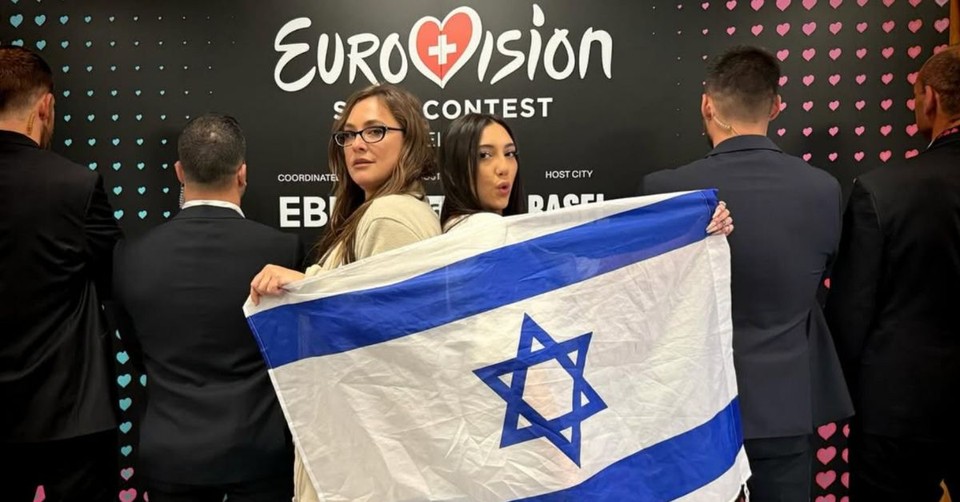Eurovision Finalist Yuval Raphael Honors Israeli Victims with Song of Songs

“Hang up the phone and play dead.” This harrowing advice from Yuval Raphael’s father saved her life on October 7, 2023, and brought her to the spotlight in Basel, Switzerland, as Israel’s representative to Eurovision this week. Most Americans have never heard of Eurovision, and surely not 24-year-old Yuval Raphael.
On October 7, 2023, Yuval was at the Nova music festival in southern Israel along the Gaza border, located in a wooded area with an adjacent lot on which a stage had been set up for all-night music and dancing. Thousands of young people camped out all night.
At 6:30 in the morning, when Hamas began firing thousands of rockets at Israel as cover for the invasion that they had planned for months, the Nova festivalgoers became easy targets. The assault included terrorists in improvised propelled hang gliders who were shooting from the air, as countless other terrorists shot, raped, sexually mutilated, tortured, kidnapped, and burned to death as many people as they could. 364 people, out of 1200 that day, were massacred on the site of the music festival, making it a cross between Woodstock and Auschwitz.
Yuval and her friends fled to a crammed fortified concrete bus shelter, about 50 people taking cover in a tiny space meant for a handful of people to take cover for a few minutes from rockets that have plagued southern Israel for more than two decades. These bus shelters were meant to protect from rockets and shrapnel, not from terrorists with AK47s, RPGs, and grenades.
Before her Eurovision fame, Yuval gave testimony at the UN. “The next thing I remember is that…one girl was just grabbing my hand really hard. She was really scared, and I was like ‘everything’s going to be okay.’” Suddenly, a Hamas terrorist stood at the entrance to the shelter, shooting wildly to kill anyone and everyone. “I turned around to the girl who was holding my hand,” Yuval testified, “and she was no longer with us. She was dead.”
Yuval was terrified. She called her father, telling him that many people inside the shelter had been murdered. In a conversation no parent could ever be prepared for, Yuval’s father told her to pretend that she was dead, to hide under the corpses of her friends and others, and not make any noise. Throughout the day, terrorists kept returning to the shelter, spraying the inside with bullets.
Yuval remained inside the shelter for eight hours, suffering a head wound and a broken leg. Finally, after hiding underneath corpses, Yuval and ten other survivors were rescued from the shelter. Out of about 50 people inside the bus shelter, four out of five were murdered.
Yuval always loved singing, but after the massacre, both as a way to honor those lost and a means of personal therapy and demonstrating resilience, she entered Israel’s popular Hakochav Haba (“Future Star”) TV reality show; the winner of which represents Israel at Eurovision. Yuval dedicated her singing to “all the angels” murdered at the Nova festival, affirming, “Music is one of the strongest ingredients in my healing process.” Yuval won. Israeli Arab singer, Valerie Hamaty, came in second, having performed with another October 7 survivor, demonstrating hope and coexistence.
Yuval arrived in Basel, targeted by terrorist supporters and numerous death threats. It’s astounding that, having survived a music festival that brought people together from many nations, she was confronted by the same hatred at the world’s Super Bowl of music festivals. Throughout her time in Basel, Yuval had unprecedented security to protect her and other members of the Israeli team. She received no grace from the haters who simply branded her as evil, because of her nationality, and despite what she survived.
At Eurovision, Yuval sang “A New Day Will Rise,” conveying the message of remembering and honoring the generation of youth Israel has lost. The song is in English, French, and Hebrew. The Hebrew verse is, appropriately, from the Song of Songs (8:7): “Many waters cannot quench love, nor can rivers sweep it away.”
Despite the protests, some 70 current and past performers, and a few participating countries that petitioned the Eurovision to disqualify her, Yuval’s song fit perfectly with this year’s Eurovision theme: “Unity Shapes Love.” She explained, “It captured exactly the message that I want to share about resilience and unity. The song is strong and powerful, but also soft and loving. When I sing it, I feel secure and open-hearted. All its lines are strong, but ‘Everyone cries, don’t cry alone’ is beyond powerful. We all go through hard times, and because doing so is a shared experience, supporting and loving each other is crucial.”
Eurovision has a dual system of voting, with each participating country selecting its own panel of judges and offering its highest coveted “douze (12) points” to any nation’s representative other than their own. Viewers around the world are also able to vote. Yet to prevent stuffing the ballot box and an unfair advantage of more populous countries, individual voters also cannot vote for their own nation’s representatives.
Yuval was ranked 5th place going into the competition. In the end, she won the popular vote from around the world, moving her up and finishing second only behind Austria’s representative. Israelis are full of pride and hope that, despite the world being so against us, maybe this is a sign that the pro-Hamas haters are really more of a loud and unpleasant minority than the reality is.
Highlighting this axis of hate, at the same time Yuval won the popular vote from the world, the Iranian-backed Houthis fired yet another ballistic missile at Israel, sending millions of Israelis to their bomb shelters in the middle of the night.
As a woman who looked death in the eye and survived, thanks in part to her father’s haunting advice, Yuval Raphael overcame death threats in Europe and came in second. She’s being celebrated for showing the same resilience and love for life that Israelis have demonstrated since October 7, albeit not without its trauma that we all still are dealing with.
And it’s the same genocidal hatred and threats against us represented in Basel, with a pro-Hamas protester actually making a gesture toward Yuval that he was going to slit her throat, from the same ilk of people and evil ideology that nurtured October 7. The world would be wise to remember all this and celebrate along with us, even if people had never heard of Eurovision or Yuval Raphael before.
Photo Courtesy: ©Instagram/yuvalraphael
Published Date: May 19, 2025
Jonathan Feldstein was born and educated in the U.S. and immigrated to Israel in 2004. He is married and the father of six. Throughout his life and career, he has been blessed by the calling to fellowship with Christian supporters of Israel and shares experiences of living as an Orthodox Jew in Israel. He writes regularly for a variety of prominent Christian and conservative websites and is the host of Inspiration from Zion, a popular webinar series and podcast. He can be reached at firstpersonisrael@gmail.com
Originally published May 19, 2025.







